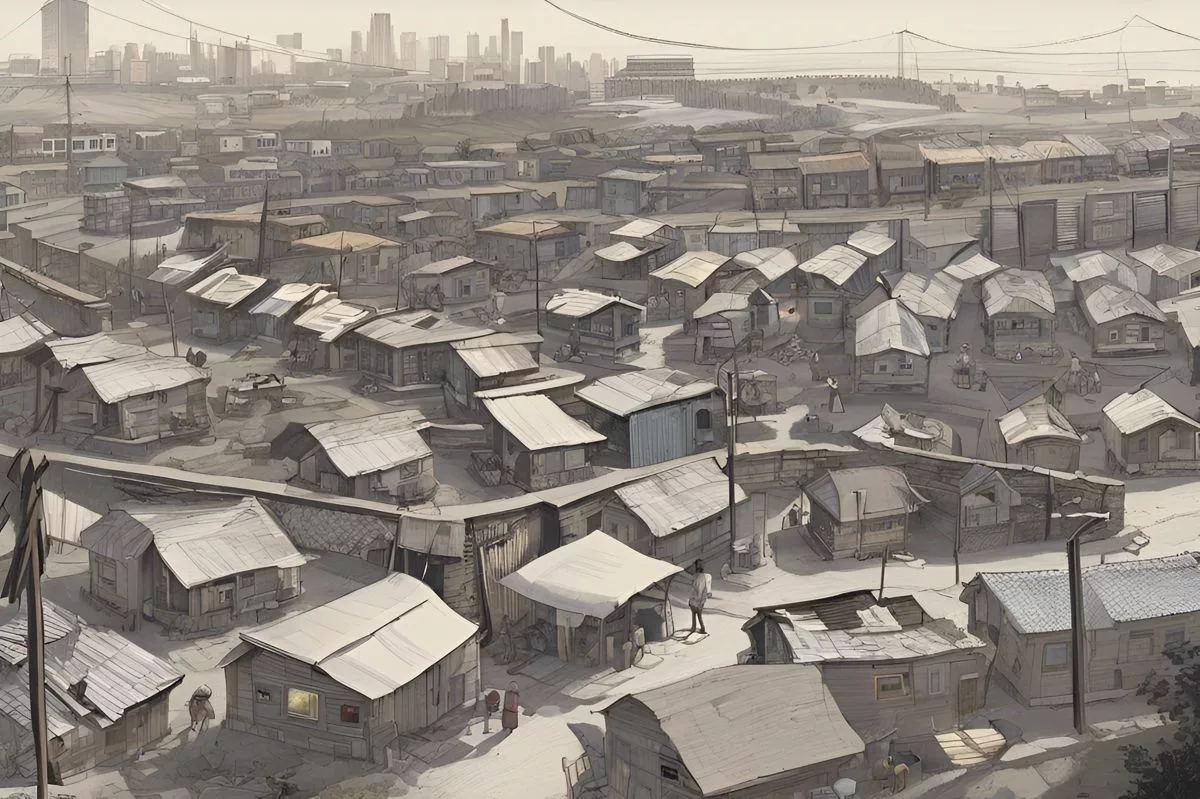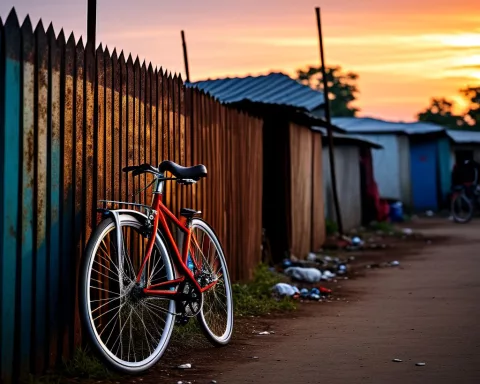The housing dilemma in South Africa is exemplified by the emergence of a shantytown on Curie Avenue. This informal settlement is encroaching on privately-owned residential districts, causing tension and unrest. The issue is complex, with political and racial dimensions, and the resolution of this crisis will significantly impact South Africa’s political landscape. As the country approaches its general elections, the future of the shantytown, Lourierpark, and ANC remains uncertain.
What is the housing dilemma in South Africa?
The housing dilemma in South Africa is severe and complex, with informal settlements like the shantytown on Curie Avenue encroaching on privately-owned residential districts. The issue also has political and racial dimensions, with the ANC and DA taking opposing stances. The resolution of this crisis will have a significant impact on South Africa’s political landscape.
The Emergence of a Shantytown
As dusk descends over the northern edges of Curie Avenue, a burgeoning shantytown rises from Bloemfontein’s dust. This haphazard settlement of corrugated iron shacks, extending almost four kilometers from the city’s boundary to the pastoral farmlands, presents a poignant emblem of South Africa’s severe housing problem. This issue has become particularly noticeable ahead of the general elections in May.
Lourierpark, a settled community just south of Curie Avenue, observes the growth of the shantytown with mounting discomfort. This privately-owned residential district of bungalows, inhabited by individuals who have painstakingly acquired their homes through loans, stands in sharp contrast to the expanding informal settlement. The Lourierpark inhabitants, metaphorically and physically separated from the squatters, have made their dissent known against what they view as an encroachment.
Adding to the increasing tension is another layer of complexity. Lourierpark is a constituency under the representation of the Democratic Alliance (DA), the political opposition. There are widespread speculations that the ruling African National Congress (ANC) may be indirectly involved in the shantytown’s growth, allegedly by infusing the district with its supporters under the pretense of rehousing.
Residents Express Discontent
Residents like Tshegofatso Tshabalala, a 38-year-old inhabitant of Lourierpark, articulate their grievances through personal lived experiences. Like her neighbors, Tshabalala took out loans to acquire her home. They conscientiously pay taxes and water bills and view the incoming settlers as catalysts for crime and instability. According to Tshabalala, the local residents are working-class families who have rightfully earned their homes. Her concerns also encompass potential depreciation of their property value, in stark contrast to their ever-increasing interest payments.
However, those looking for a fresh beginning in the shantytown narrate a different story. For instance, Felicia Legetla, a 31-year-old expectant student planning to move out of her grandmother’s house, criticizes the decisions leading up to the housing crisis. She points out the failure of provincial authorities to utilize funds meant for informal settlements.
Political Complexities and Racial Tensions
As the shantytown expands, it encroaches not only on the physical boundaries of Lourierpark but also on white-owned farmland, adding racial dimensions to the dispute. Some squatters accuse the Lourierpark homeowners of betraying the anti-Apartheid movement by aligning with the DA, an accusation vehemently denied by the latter.
The ANC mayor, Gregory Nthatisi, admits to the intricacy of the situation, acknowledging that halting the encroachment wouldn’t be an easy task. The housing crisis, accompanied by economic stagnation and frequent power outages, places the ANC in a precarious position as the elections approach, possibly resulting in a fall in their vote share for the first time since the advent of democracy.
Meanwhile, the DA hopes to leverage this situation to its advantage. DA provincial head, Roy Jankielsohn, advocates against land seizures and criticizes the mayor for not enforcing a court order to remove the squatters. He anticipates that the ANC’s strategies will have adverse repercussions after the elections.
The Larger Picture
The Curie Avenue impasse serves as a smaller representation of South Africa’s larger housing crisis, entwined with politics, race, and history. As the country moves towards its general elections, the future of the shantytown, Lourierpark, and ANC remains uncertain. Amidst this ambiguity, one thing is unequivocally clear – the resolution of this crisis will chart the course of South Africa’s political landscape for years to come.
What is the shantytown on Curie Avenue?
The shantytown on Curie Avenue is an informal settlement that has emerged on the northern edges of Bloemfontein, South Africa. It has encroached on privately-owned residential districts, causing tension and unrest.
What are the concerns of residents in Lourierpark?
Residents in Lourierpark are concerned about the potential depreciation of their property value, in contrast to their ever-increasing interest payments. They also view the incoming settlers as catalysts for crime and instability.
What are the concerns of squatters in the shantytown?
Squatters in the shantytown criticize the failure of provincial authorities to utilize funds meant for informal settlements. They also accuse Lourierpark homeowners of betraying the anti-Apartheid movement by aligning with the Democratic Alliance.
What are the political complexities and racial tensions surrounding this issue?
The issue has political and racial dimensions, with the ANC and DA taking opposing stances. Squatters accuse Lourierpark homeowners of betraying the anti-Apartheid movement, adding racial dimensions to the dispute. The resolution of this crisis will have a significant impact on South Africa’s political landscape.
What is the larger picture of the housing crisis in South Africa?
The Curie Avenue impasse serves as a smaller representation of South Africa’s larger housing crisis, entwined with politics, race, and history. As the country moves towards its general elections, the future of the shantytown, Lourierpark, and ANC remains uncertain.
What is the stance of the ANC and DA regarding the housing crisis?
The ANC and DA have opposing stances regarding the housing crisis. The ANC mayor, Gregory Nthatisi, acknowledges the intricacy of the situation and the difficulty of halting the encroachment. The DA advocates against land seizures and criticizes the mayor for not enforcing a court order to remove the squatters.












